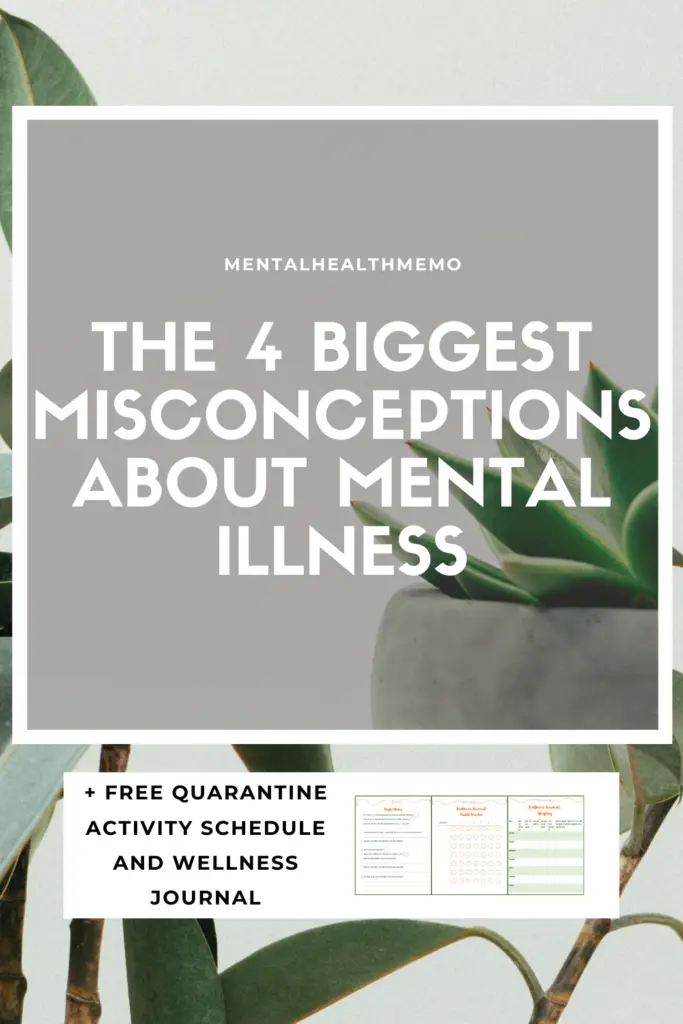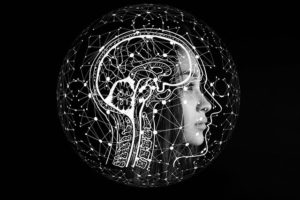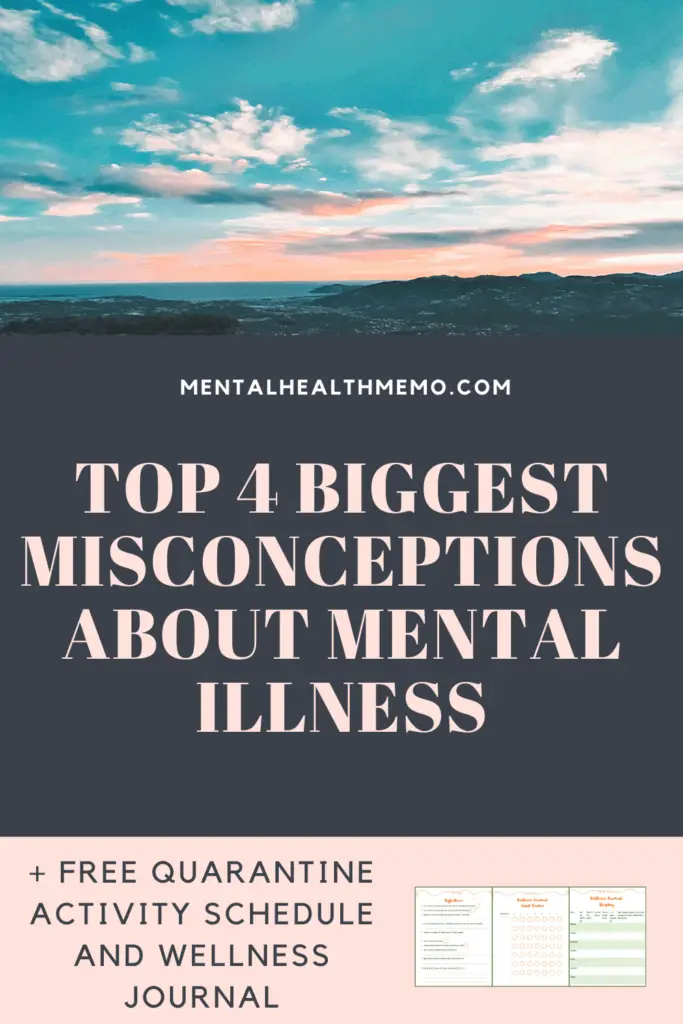Table of Contents
Why you must change these misconceptions about mental illness
All of us have our misconceptions, prejudices, and stereotypes we hold to be true about others. This is human.
However, it’s important to challenge and reflect on these misconceptions so that we can grow as individuals and be kinder to one another. It is already hard enough to be mentally ill, and society’s ignorance certainly doesn’t help.
Mental illness affects 1 in 4 people across the globe. So by learning about these false understandings of mental illness, you’re not just helping one random person in your life. You’re helping a family member, a co-worker, a friend, a partner.
Be a better human being by not practicing and believing in these misconceptions. After all, you never know who you’re hurting with them.
In this post, I wanted to talk about the 4 biggest misconceptions people often hold about folks with mental illness. I’ve already written a post about The 8 Biggest Misconceptions About Anxiety You Probably Have, however, this one is about mental illness in general.
Without further ado, let’s jump in!

1. It’s all in your head
This is a really weird concept to me. When I have a panic attack or am feeling really depressed and people tell me that it’s just “all in my head” my response is well… yeah, it is. My brain is in my head and my brain is clearly experiencing a disruption or abnormality so yes, I suppose it IS in my head.

But I know that’s not what they mean. I know that what they ACTUALLY mean is it’s something I’m making up and I can have control over it.
We seem to think that the brain is some type of abstract thing and that it can’t have biological problems with it, in the same way, the rest of our bodies can. You wouldn’t tell a person with diabetes to stop under or overproducing insulin, because they can’t control it. Yet, we don’t think this way about the brain because we seem to think that we can control our mind in a way we can’t the rest of our body.
But this is inaccurate. While the idea of thought and consciousness is abstract, the brain is not. The brain is an organ just as much as the lungs, the liver, the bladder, the heart, or the stomach. And thus, it can malfunction in the same way.
If we look at brain scans, we can see the difference in brain size, activity and which parts of the brain are (in)active between a “normal” brain and a “mentally ill” brain. When we have panic attacks, you can see that the Amygdala is triggered and starts going off. You can see inactivity of the prefrontal cortex in folks with sociopathic traits. There are physical, tangible, biological malfunctions we can have in our brain that result in mental illness.
And we do NOT control that. Just as much as we don’t control a stomachache.
So stating that it’s “all in your head” and you just need to “get a grip” is incredibly offensive, rude and based off completely inaccurate information and understanding of the human brain.
2. You can be “fixed”
Continuing from the previous point, people seem to assume that you can just “overcome” mental illness and get “fixed” because it’s something you can control (even though you actually can’t).
For example, if you were to go into intensive inpatient therapy for your mental illness, people expect that when you come out you’ll be “fixed” and “normal”. That the illness will somehow be gone after your treatment and that you would have overcome it, thus, not experience the symptoms anymore.
This is incredibly inaccurate. Unless you have an acute disorder (a temporary or non-permanent disorder), you likely will not “overcome” your disorder and get rid of it. With chronic mental illness, symptoms will always be there in varying amounts of severity regardless of how much therapy or medication you take.
Now if you’re mentally ill and I’m scaring you, please don’t misunderstand. You can absolutely live a fulfilled, wholesome, happy life alongside a mental illness. You can drastically minimize symptoms by doing therapy, taking medication, living a holistically healthy life, etc.
However, I think it’s important to dismantle the idea that people can just get “fixed” from their mental illness because it paints an inaccurate picture of what mental illness is. It also created unrealistic expectations for folks who think they need to be “normal” and get rid of their mental illness entirely to live a happy life.
You can live with your mental illness and still have a fulfilled life. You are not any less just because you are mentally ill, and you do not have to be “fixed”, nor can you be.
3. You can tell when someone has a mental illness
A lot of people think that they can tell when someone is mentally ill. They often describe a person experiencing homelessness talking to themselves or yelling at the sky. They might also imagine a serial killer, a pedophile, a violent person, or an overly reserved person.
However, they never describe someone who is mentally ill as capable, successful, personable, funny, intelligent, refined, or creative.
That’s because media has really impacted the way that we understand folks with mental illness. We think that they have to be someone bad, or be extreme in some way. But the reality is, those people are the exceptions not necessarily the rules. Quite frankly, I don’t think there even ARE rules for how to be “mentally ill”.
I think a more realistic picture of folks with mental illness is: doctors, CEOs, mothers, fathers, teachers, truck drivers, social workers, psychologists, engineers, plumbers, fast food servers, grandparents, chefs, cleaners, graphic designers, writers, bloggers, actors and everyone else in between.
Just because you have a mental illness does not mean it is evident.
For example, I have very high functioning anxiety which tends to make me a perfectionist, an overachiever, and it makes me pretend to always be in control of myself and be composed. I often give off a very put-together image to people.
So they are often surprised when I say how severe my mental illness is, and how disabling it is. They’ll often say,
“I would have never guessed you had a mental illness, you’re such a hard worker, you’re good at what you do, you’re well put together”
and my response typically is,
“So are mentally ill people not supposed to be those things?”.
See, we have a negative and inaccurate understanding of what mental illness looks like. It’s incredibly important that we change it because you never know who does or doesn’t have a mental illness.

4. Everyone who has the same mental illness experiences it the same
Another misconception people seem to have is that everyone who has the same mental illness experiences it in the same way. Thus, they think that the same things will help everyone.
Again, this is incredibly inaccurate. Everyone experiences mental illness in their own unique way, and they will feel better in their own unique way too.

Of course, a lot of times, recommending a way to feel better because someone else benefited from it is a good intended and good-willed thing to do. And I’m not saying people shouldn’t recommend things for each other. Clearly, I’m doing that with my blog.
However, I think it’s important to not put expectations for things to work onto people. Just because it worked for you, doesn’t mean it’ll work for your friend. So, it’s important to then not make them feel bad or guilty for it not working.
I think it’s also important to not clump people up based on their mental illness because it creates stereotypes that are often inaccurate. It also doesn’t take into account comorbidity (the overlapping of various mental illnesses in one person), which can make people experience a certain mental illness differently.
In all
I think that we need to call out and be mindful of our misconceptions of mental illness so that we can help break stigma, educate others, and inspire those who are also mentally ill.
If you had any of these misconceptions, please DO NOT FEEL GUILTY OR BAD. Nobody can know everything about every single topic in the world so don’t stress about it. Instead, take a moment to reflect on the misconceptions you hold, and try to challenge them. Try and grow from those mistakes rather than beat yourself up.
And if you have been a victim of these misconceptions, please know that you are not alone. Everyone with a mental illness has at some point faced prejudice in their life. That is why it’s so important that we continue educating and pushing for progressive change.
Stay healthy, safe, and be kind to one another.
All my love,
T


This is such an important thing for us to talk about and spread awareness of as these misconceptions can be so damaging to our community. Thank you so much for writing about it and sharing it, and helping to end the stigma.
Truly my pleasure, thank you for reading! 🙂
So important. I get so freaking annoyed when people act like depression is something you can just overcome, like I’m weak because I have these intrusive thoughts and everything. People without mental illness can’t comprehend the struggle every day is, just like someone who isn’t blind can’t truly comprehend navigating the world without eyes. We should just trust someone’s personal experiences.
I completely feel for your frustration. It’s so difficult when people won’t take your word for how difficult it can be to manage a mental illness. Thank you for reading love!
I agree with these posts. More understanding is needed.
Thank you for reading!
These are fantastic points to clarify. They are sadly all too frequently thought by a lot of people. Thanks for being a good advocate. Keep up the good work!
I agree they are sadly much too frequently thought. Thank you for your support!